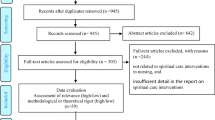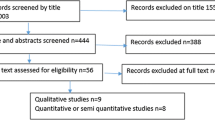Abstract
Evidence based spiritual care utilizes empirical evidence on spirituality in addressing the spiritual needs of patients. Objections to evidence based spiritual care include issues of methodology and ethics. Reasons favoring evidence based spiritual care stem from a view that it is not an oxymoron but a paradox. An example of evidence based spiritual care is described using cardiac patients in a CCU unit. Concluding remarks note that we are at the beginning and need a new scientific/theological paradigm that integrates not separates science and theology.
Similar content being viewed by others
References
Astin, JA., Harkness, E., and Ernest, E., (2000) The efficacy of 'Distant Healing': A systematic review of randomized trials Annals of Internal Medicine 132: 903-910.
Barbour, I., (1997) Religion and science: Historical and contemporary issues San Francisco: Harper-Collins.
Berry, BG (1998) The relationship between faith and well being Journal of Religion and Health 37(2) Summer, 125-136.
Bryd, R., (1988) Positive therapeutic effects of intercessory prayer in a coronary care unit population. Southern medical journal 81(7), 826-829.
Clebsch, W and Jaeckle, CR (1967) Pastoral care in historical perspective New York: Harper.
D'Aquili, E and AB Newberg (1999) The mystical mind: Probing the biology of religious experience Minneapolis: Fortress Press.
Donald, A (1992) Evidence-based medicine: A report from McMaster medical school and teaching hospitals Anglia and Oxford Health Authorities; Brisbane, Australia.
Epperly, BG (2000) Prayer, process and the future of medicine Journal of Religion and Health 39(1) Spring, 23-37.
Gall, TL (2000) Integrating religious resources within a general model of stress and coping: Long-term adjustment to breast cancer Journal of Religion and Health 39(2) Summer 2000, 167-182.
Gerkin, C., (1997) Introduction to Pastoral Care Nashville: Abingdon Press.
Harris, WS., Gowda, M, Kolb, J, Strychacz, C, Vacek, JL, Jones, PG, Forker, A, O'Keefe, JH, and McCallister, BD, (1999) A randomized controlled trial of the effects of remote, intercessory prayer on outcomes in patients admitted to a coronary unit. Archives of Internal Medicine vol. 159, Oct 25 1999, 2273-2278.
Holifield, EB., (1983) A history of pastoral care in America Nashville: Abingdon Press.
Koenig, H., (1997) Is religion good for your health: The effects of religion on physical and mental health New York: Haworth.
Lancet, September 23 1995, Editorial p. 785.
Levin, JS., Larson, DB., and Puchalski, CM., (1997) Religion and spirituality in medicine: Research and education, JAMA Spetember 3, 278(9), 792-793.
MacNeill, T., (1951) A history of the cure of souls New York: Harper.
Madden, KW (2001) Passion or perjury: Center or circumference? Journal of Religion and Health Summer, 289-304.
Marks, S., (1999) Qualitative Studies PDQ Evidence-based principles and practice A. McKibbon (ed.) Hamilton: BC Decker, 187-204.
McKibbon, A.,(1999) PDQ Evidence-based principles and practice Hamilton: B.C. Decker.
Mays, N., and Pope, C., (1995) Rigour and qualitative research British Medical Journal 311 July 8, 109-112.
Meakes, E., O'Connor, T., and Carr, S., (2002) The great leveler: Gender and the Institutionalized Disabled on Faith and Disability, Journal of Religion, Disability and Health (in press).
O'Connor, T., Meakes, E., McCarroll-Butler, P., Gadowsky, S., and O'Neill, K., (1997) Making the most and making sense: Ethnographic research on spirituality in palliative care The Journal of Pastoral Care Spring 51(1), 25-36.
O'Connor, T., and Meakes, E., (1998) Hope in the midst of challenge: Evidence-based pastoral care The Journal of Pastoral Care 52(4) Winter, 359-368.
O'Connor, T, McCarroll-Butler, P, Meakes, E, Jadad, A and Davis, A (2002) Review of quantity and types of spirituality research in three health care databases (1962-1999): What are the implications for health care ministry? The Journal of Pastoral Care Summer 56(2) (in press).
Oden, T., (1984) The care of souls in the classic tradition Philadelphia: Fortress Press.
O'Laoire, S., (1997) An experimental study of the effects of distant, intercessory prayer on selfesteem, anxiety and depression. Alternative Therapeutic Health Medicine 1997, 3, 38-53.
Rahner, K., (1989) Foundations of Christian Faith New York: Crossroads.
Rosenberg, W., and Donald, A., (1992) Evidence-based medicine: An approach to clinical problem-solving British Medical Journal 310, April, 1122-5.
Sagar, S., (2002) Restored harmony: An evidence based approach for integrating traditional Chinese medicine into complementary cancer care Hamilton, ON: Dreaming Dragonfly Communications.
Sicher F., Targ, E., Moore, D., Smith, HS., (1998) A radonmized double-blind study of the effect of distant healing in a population of AIDS patients: A report of a small scale study Western Journal of Medicine 169: 356-363.
Sloan, R., Bagiela, E., and Powell, T., (1999) Religion, spirituality and medicine The Lancet, 353, February 20, 664-667.
Sloan, R., Bagiella, E., VandeCreek, L., Hover, M., Casalone, C., Hirsch, T., Hasan, Y., Kreger, R., Poulos, P., (2000) Sounding board: Should physicians prescribe religious activities The New England Journal of Medicine, 342(25), June 22, 1913-1916.
Smyth, P., and Bellemare, D., (1988) Spirituality, pastoral care and religion: The need for clear distinctions Journal of Palliative Care 4 (1&2), 86-88.
Tracy, D., (1987) Plurality and ambiguity New York: Harper and Row.
VandeCreek, L., (1999) Should physicians discuss spiritual concerns with patients? Journal of Religion and Health 38(3) Fall, 193-201.
Walker, Sr, Tonigan, JS., Miller, WR., Corner, S., Kahlich, L., (1997) Alternative Therapeutic Health Medicine 1997, 3, 79-86.
Webster's Seventh New Collegiate Dictionary (1965) Toronto: Thomas Allen and Sons.
Author information
Authors and Affiliations
Rights and permissions
About this article
Cite this article
St. James O'Connor, T. Is Evidence Based Spiritual Care an Oxymoron?. Journal of Religion and Health 41, 253–262 (2002). https://doi.org/10.1023/A:1020288920502
Issue Date:
DOI: https://doi.org/10.1023/A:1020288920502




